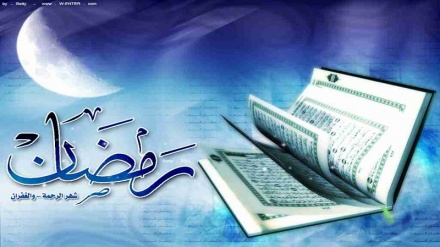Blessed Month of Ramadhan
Welcome to the 29th episode of the series “Blessed Month of Ramadhan”. How appropriate it would be if we control our remarks, in addition to avoidance of foods and drinks while we fast for a number of known hours, during the blessed month of Ramadhan. In this manner, we have taken major steps in the servitude of God Almighty.
Let’s continue avoidance of sins and negligence, and adorn one’s soul with beautiful spiritual virtues, in the opportunity which exists in the remaining hours of the blessed month of Ramadhan. On the 29th day of the blessed month of Ramadhan, let’s speak of the plagues of tongue, upon presentation of an anecdote.
You have all heard of the Sage Luqman, whom God Almighty has mentioned in the holy Qur’an. Some days ago we presented to you glimpses of his wisdom, prudence and sagacity. Once it happened that while he was serving a certain master after being sold into slavery by a group of bandits who kidnapped him, the master, finding him honest, noble and rational, asked him to slaughter a sheep and to bring to him its two worst organs. Luqman did as he was told and presented to the master its tongue and heart. The master kept silent and understood there was some reason in Luqman’s presenting of the sheep’s tongue and heart to him. A few days later, he asked Luqman to slaughter another sheep and bring its two best organs. Luqman did as he was told and again presented the tongue and the heart. The master now became confused, and said: when I asked you to bring the worst parts of the sheep, you brought its tongue and heart, and when I asked you to bring the best parts of the sheep, you once again chose to bring its tongue and heart? How could you explain this? Luqman pointed out that when the heart is pure and the tongue tells only the truth, then these two organs are the best part of the body. Likewise, when the heart is tainted and the tongue tells lies, these same organs become the worst parts of the body.
Thus, the tongue is one of the most important parts of the body that could either be the cause of sins or the reason for benevolent acts and salvation. One should control the tongue. Sins such as gossips, accusations, humiliation, and lies are all considered as plagues of tongue. Islamic teachings have called on us to express utter appropriate remarks in order to please God. In ayah 83 of Surat-al-Baqarah, God notes speak kindly to people.
“And when We took a pledge from the Children of Israel: ‘Worship no one but Allah, do good to parents, relatives, orphans, and the needy, and speak kindly to people, and maintain the prayer, and give the zakāt,’ you turned away, except a few of you, and you were disregardful.”
It is obvious by the wordings of the holy Qur’an the Israelites broke their covenant with God, violated divine laws, indulged in all sorts of sins, including misuse of the tongue through lies, backbiting, blasphemy and the like, and therefore punished.
Imam Zain al-Abedin (AS), the 4th Infallible Heir of Prophet Mohammad (blessings of God upon him and his progeny) has said that good remarks increase our subsistence and prosperity; earns respect among family members and in society; prolongs life; and ultimately leads to the reward of paradise in afterlife. On the other hand, says the 4th Imam, pointless remarks lead to many slip-ups, and set the stage for commitment of sins.
God, in Holy Qur’an, refers to those who gain entry to Heavens. In ayahs 25 and 26 of Surat-al-Waqe’ah, he says:
“They will not hear therein any vain talk or sinful speech, but only the watchword, ‘Peace!’ ‘Peace!’
In Ayah 2 of Surat-al-Jumu’ah of the Holy Qur’an, God states about his sending of the Prophet of Islam:
“It is He who sent to the unlettered people a Messenger from among themselves, to recite to them His signs, to purify them, and to teach them the Book and wisdom, and earlier they had indeed been in manifest error.”
This ayah refers to three plans of the Prophet of Islam which are namely reciting God’s signs to the people; purifying them through insistence on good deeds; and teaching them the Book and wisdom. In other words, this ayah points out that God sent to the unlettered people a Messenger from among themselves to recite to them His signs, and to groom them in a way that would secure their prosperity so that they would carry out good deeds instead of misdeeds; attain perfection and prosperity, and put behind polytheism and maintain faith in monotheism.
Purification of soul is founded on strengthening of resolve and the sense of liberation from the yoke of carnal desires. Purification of soul is defined as clearance of one’s soul from the evils of polytheism, false and superstitious beliefs, because as long as one does not clear his soul from these evils, he is not prepared to learn the divine Book and true knowledge. Therefore, this ayah has prioritized purification of soul in order to help people better understand the wisdom of the Book of God. The interesting point in this ayah is that it states the Prophet of Islam was divinely appointed from this same group of unlettered people, to clarify and manifest the grandeur of his universal mission. A flawlessly eloquent book like Holy Qur’an which contains timeless wisdom, can never be the product of a hyman being’s mind, and is in fact a true miracle and a clear proof of the righteousness of the God-given mission of the Last and Greatest Messenger of God, Prophet Mohammad (blessings of God upon him and his progeny).
Fasting, which is easy during the initial days of the blessed month of Ramadhan, becomes relatively difficult towards the end of the month, due to exhaustion. That is the reason God the All-Wise has decreed only one month of obligatory fasting. The problems of exhaustion could be related to your dietary regimen and shortage of a number of vitamins. To prevent the emergence of this problem, you can use food supplements, and continue to consume them for a while in the days after the blessed month of Ramadhan. At times, during the last ten days of the blessed month of Ramadhan, some fasters may become weak and catch a cold. This is because of the weakness of their immune system and shortage of vitamins such as Vitamin C and minerals. Meanwhile, some fasters consume a very small amount of food in Sahari and neglect their dietary regimen. These fasters are recommended to consume multivitamins at Iftar and Sahari to meet their bodies’ need for vitamins and minerals. If the fasters consume one or two multivitamin pills throughout the day, they would not experience shortage of vitamins in the blessed month of Ramadhan. Meanwhile, going to extremes always leaves detrimental impacts. This is also the case in consumption of supplements. Some decide to consume food supplements on their own in a bid to reinforce their drained energy. However, excessive consumption of supplements could cause nausea, vertigo, and blurred eyesight. Excessive consumption of Vitamin C impacts one’s kidneys in the long run. The best thing to do is to consume vitamins and supplements under the supervision of a nutritionist.
Shortage of Vitamin B in the body of fasters, especially close to Iftar, can cause dizziness and headache. So it is recommended to consume an appropriate amount of foods, which contain Vitamin B, at Sahar and Iftar in the blessed month of Ramadhan. In this month, fasters face shortage of energy. Given the role of Vitamin B in the metabolism of carbohydrates, and fats, and release of energy in the body, fasters can gain the necessary energy for carrying out their activities with consumption of foods which are rich in Vitamin B, and/or upon consumption of food supplementary pills. Hopefully, by the end of the blessed month of Ramadhan, you have purified your souls, while also paying attention to your physical health.
AS/ME


